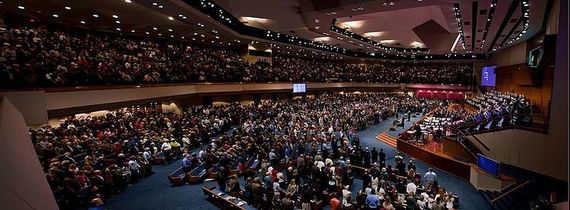"Southern Evangelicals Dwindling--and Take the GOP Edge With Them" screams a headline in the online Atlantic (17 Oct. 2014). Below it, Robert P. Jones, the adventurous and reliable CEO of the Public Religion Research Institute (PRRI) reports on the Institute's 43,000 interviews throughout 2013.
I'll exegete the meaning of the first three words of that headline, and leave the last seven to prognosticators, politicians, and pollsters. Explanation: Sightings on Mondays doesn't usually "do" political hard news and partisan opinion, thanks to a "division of labor."
For once, a three-line autobiographical note is in order: For 35 years I taught graduate students in the University of Chicago Divinity School's "religious" history area, which focuses on, yes, "religion." I also taught in the University's humanities' Committee on the History of Culture, which concentrated on, yes, "culture." Of course, the two spheres intersect. (Paul Tillich: "religion is the substance of culture, and culture the form of religion.")
Still we specialize. My research led me less to the story of guns at Gettysburg or the gore in the trenches at Verdun than to letters written by mothers to desperately threatened soldiers or to the sermons of the grieving survivors of casualties.
We need a text to explain the division between religious history and politics. For me, a quotation by Josẻ Ortega y Gasset, loaned to me by my late colleague Karl J. Weintraub, has always been determinative: "Decisive historical changes do not come from great wars, terrible cataclysms, or ingenious inventions: it is enough that the heart of man incline its sensitive crown to one side or the other of the horizon"--in my case, toward deep versus casual commitment to the substance of evangelical Protestant faith and to its cultural forms in the American South.
What is happening to the "substance of culture" in the American South and in America at large, thanks to the "dwindling" mentioned in the headline is suggested by PRRI's findings, corroborated by others and commented on by Jones. He remembers the "heady days of evangelical prominence in the 1980s and 1990s," when its leaders noted the decline of more liberal mainline Protestant culture.
Now? The core of the evangelical culture was in the Southern Baptist Convention, down from 22 to 18 percent in the most recent six years. Age? Three in ten of those over 65 are countable as white evangelical Protestants, only one in ten are findable in the 18 to 29 cohort.
What goes on? Jones: "the growth of non-black ethnic minorities"--blacks were mainly evangelical Protestants--and "surprisingly, the growth of the religiously unaffiliated across the South." These and other factors suggest "the beginning of a major shift away from a robust white evangelical presence in the South."
Jones is not anticipating last rites for it--don't simply count it out, and don't overlook its impressive but specialized (as opposed to culture-wide) vitalities. As noted above, I leave to others speculations, assessments, and prognostications of what all of this means for politics in 2014 and after. It is an alert to observers like me at the intersection of religion and culture to pay attention to the individual and communal directions and measures of the human heart as it "inclines its sensitive crown" this way or that.
Oh, yes, Ortega and Weintraub and the folks they influenced do not for a moment overlook or play down "historical changes that come from great wars, terrible cataclysms, or ingenious inventions," represented currently by ISIS, Ebola and the digital revolutions.
Resources:
Jones, Robert P. "Southern Evangelicals: Dwindling --and Taking the GOP Edge With Them: Why are democrats keeping it close in five key Senate races? Look at changing demographics." Atlantic, October 17, 2014, Politics.
Ortega y Gasset, José. Cited by Karl J. Weintraub in Visions of Culture: Voltaire, Guizot, Burckhardt, Lamprecht, Huizinga, Ortega Y Gasset. Second Printing edition. Chicago: University of Chicago Press, 1969.
Public Religion Research Institute.
Image: First Baptist Church of Jacksonville, Florida, Fbcjax / Wikemedia Commons.
This post originally appeared in Sightings, an online publication of the Martin Marty Center for the Advanced Study of Religion, University of Chicago Divinity School.
NOTE: This article is not available for republication without the consent of Sightings. Please contact the Managing Editor, Myriam Renaud, at DivSightings@gmail.com.
